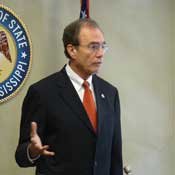Despite a mistake in preparing absentee ballots, state officials say people's votes will be counted, but could present legal challenges later. An error in preparing them initially left information about the cost of the three initiatives off absentee ballots.
After the error was discovered, some counties had to reprint their ballots.
Secretary of State Delbert Hosemann's office prepared the absentee ballots in September and sent them to the counties to be printed without the fiscal analysis.
The attorney general's office discovered the mistake, and Hosemann's office sent the counties the fiscal analysis to include with future ballots.
The state constitution mandates that a fiscal analysis from the Legislative Budget Office for each initiative must appear on the ballot.
Some absentee ballots had already been sent out without the information when the mistake was discovered, however.
Both the secretary of state's office and the attorney general's office say those ballots are valid and will be counted, although a spokeswoman for the attorney general said the error could possibly open the door for a legal challenge after the election.
Hinds County Election Commissioner Connie Cochran said officials have now reprinted the absentee ballots with the fiscal impact information on them. The secretary of state's office is paying to reprint the absentee ballots, but Pamela Weaver, communications director for the secretary of state, said she did not know how much that would cost or how many counties have reprinted their absentee ballots.
Despite the hullabaloo about getting the information right on the absentee ballots, voter turnout may be a bigger problem. As of Tuesday afternoon, Hinds County Commissioner Jermal Clark said voters in the county had returned 819 ballots--a lower return than average. Cochran says absentee voting usually shows a trend in voter turnout at the polls. Heavy turnout in absentee voting generally predicts heavy turnout on Election Day.
"It's indicative of what kind of turnout you get," she said.
"It has not been a really heavy year as far as absentee voting is concerned."
Hinds County has more than 123,000 registered voters.
Madison County Circuit Clerk Lee Westbrook said her office has received 675 requests for absentee ballots so far, and 528 have been returned. That's a lower number than four years ago, and about the same number as for the primary in August.
Like Cochran, Westbrook said absentee voting is usually a good indicator of how many people will turn out to vote next week.
"With so many important races on the ballot, I cannot imagine why more voters are not coming in to vote absentee unless everybody is going to be in town on that day," she said.
This year, voters will decide on three ballot initiatives--whether "personhood" legally begins at the moment of fertilization, whether the state can take land by eminent domain and transfer it to private owners, and whether voters should have to present photo identification at the polls.
Although the budget office did not find any costs associated with the personhood or eminent-domain initiatives, voter identification will cost taxpayers, because the state would have to provide free photo ID cards of some kind to voters who do not already have them.
The Legislature will have to work out the specifics of voter identification if the initiative passes.
Sen. Joey Fillingane, R-Sumrall, proposed the initiative, and he estimated that it would cost $100,000 to provide free voter-identification cards to people who do not have a photo ID already.
The Legislative Budget Office used a different method to estimate the cost of the initiative, however, and put the voter ID price tag at almost $1.5 million. While Fillingane assumed the Legislature would vote in favor of a new ID that could only be used for voting and few people would need one, the budget office assumed the state would provide the ID cards that are already available through the Department of Public Safety. If that is the case, people could use those ID cards for things other than voting, such as cashing a check, but the Department of Public Safety would lose revenue by providing them for free.



Comments
Use the comment form below to begin a discussion about this content.
comments powered by Disqus